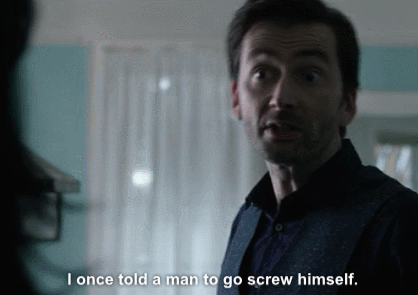
Jessica Jones Reveals the Petty Monstrosities of a Realistic Super Human
Spoilers for Jessica Jones! If you haven’t seen it yet, go binge watch it and then come back!
Marvel’s Jessica Jones Netflix series has a lot going for it: a pair of competent, intense and loving female friends, each of which gets their very own super hot male love interest, a gritty but fond portrayal of New York City and an arresting mix of soap opera style drama (I’m looking at you, Hogarth), witty dialogue and some pretty decent action for a television series.
The most compelling part of Jessica Jones, though, is how it grounds all of its heroes and villains with realistically human motivations, despite their miraculous powers. The result is a world in which super humans aren’t just running around trying to take over the planet or protect it from an alien invasion. They are also using their gifts to achieve petty victories, to settle scores, and to, as Jessica puts it, “try to make a living in this goddamn city.”
Of course, David Tennant’s superbly creepy Kilgrave is a perfect example of this dynamic. He could use his mind control powers to sway the decisions of governments or to amass great wealth and fame. And over the course of the series he does come up with some… creative uses for them.
 Instead, he mostly uses them in the manner of a petulant man-child who feels entitled to the love and attention of others without ever having to reciprocate himself. His abuses of Jessica run the gamut from rape and physical torture to gas lighting to admonitions that she “smile.” In fact, that is what makes him Marvel’s most terrifying villain to date: he combines his fantastic powers with the most common place casual sexism that women encounter everyday. As Angelica Jade Bastién put it for Vulture:
Instead, he mostly uses them in the manner of a petulant man-child who feels entitled to the love and attention of others without ever having to reciprocate himself. His abuses of Jessica run the gamut from rape and physical torture to gas lighting to admonitions that she “smile.” In fact, that is what makes him Marvel’s most terrifying villain to date: he combines his fantastic powers with the most common place casual sexism that women encounter everyday. As Angelica Jade Bastién put it for Vulture:
what’s most frightening about Kilgrave is just how ordinary he is. Jessica Jones is intensely interested in delving into the ways women are silenced and cut off from any chance at autonomy — from not believing their stories to turning a blind eye to the physical aftermath of their abuse.
In other words, the scariest thing about Kilgrave is how similar he is to a kind of man we have all met over the course of our lives, the kind we hope and pray we will never find ourselves tied to.
Simpson, the good cop/war hero turned ruthless mercenary, also finds himself acting out a typical masculine fantasy. More than anything else, Simpson wants to be a hero, to protect his girlfriend Trish, to save the city. However, his ego is constantly getting in his way. His confidence in his own abilities was rocked when he found himself under Kilgrave’s spell and to get his mojo back he seemingly turns what should be a fight to bring a criminal to justice into a set of personal pissing matches with Kilgrave and even with Jessica (who is also a source of jealousy due to her close friendship with Trish). In his quest to reassert himself as the alpha male, he winds up augmenting his body with its own set of superpowers. But he also loses his sense of right and wrong and even stoops to murdering a fellow cop so that he can get his way.
But it isn’t just the villains whose motivations are often less than noble.
Jessica herself, hero of the series though she may be, also uses her powers more to assuage her own guilt over the atrocities Kilgrave forced her to commit when she was trapped within his orbit then out of any desire to be a selfless heroine. Trish Walker might not be a superhero yet, but her Krav Maga training and obsession with security are a reaction in her toxic relationship with an abusive mother. And even Luke Cage, seemingly the most grounded and emotionally healthy member of the show’s cast, considers using his super strength to take revenge on the bus driver he believes is responsible for his wife’s death.
In other words, Jessica Jones is the most fascinating, heart-breaking entry into the Marvel cinematic universe yet. Not because it is the most over-the-top fantastic, but because it is the most familiar. Audiences can find themselves sympathizing with the most unconventional people because their emotions and traumas are so very unremarkable.
 If our world really were populated by people with gifts, the show seems to say, we wouldn’t all suddenly transform into Superman, wanting only to fight for truth, justice, and the American way. Rather we would continue to wallow in the same old ruts and relive the same old cycles that have always shaped us. We would increase our capacity for self-destruction. But then again, we might also improve our chances at breaking free.
If our world really were populated by people with gifts, the show seems to say, we wouldn’t all suddenly transform into Superman, wanting only to fight for truth, justice, and the American way. Rather we would continue to wallow in the same old ruts and relive the same old cycles that have always shaped us. We would increase our capacity for self-destruction. But then again, we might also improve our chances at breaking free.



